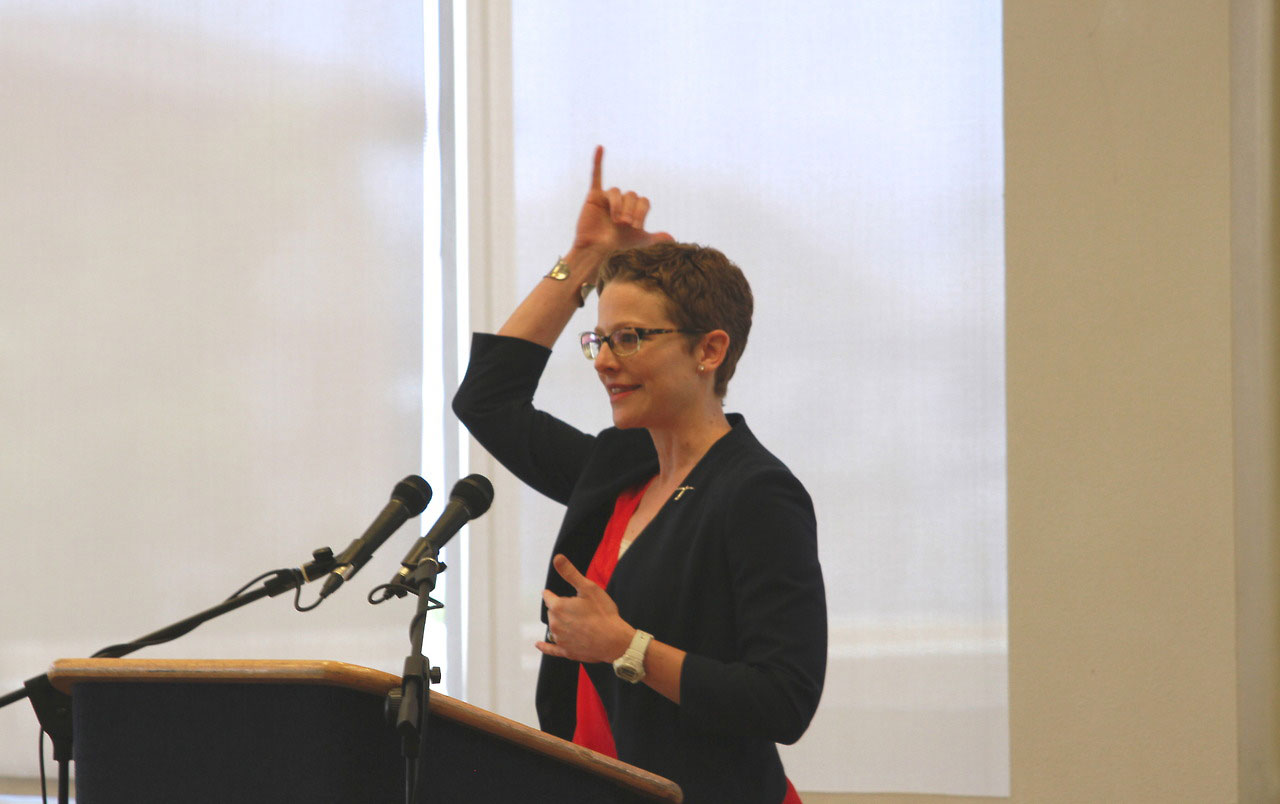
Dr. Allison Brownell Tirres, assistant professor at DePaul University College of Laws, addressed a crowd of students, local activists, concerned citizens and professionals as part of the University of Texas at El Paso Centennial Lecture series. (Héctor Bernal/Borderzine.com)
EL PASO – Immigration policies from the past must be studied in order to reform them for the future was the premise of a lecture by Dr. Allison Brownell Tirres on the topic of deportation, a subject that is as crucial as it is complex for residents of the borderland.
“I want to try and put these stories in an historical context and I also want to suggest how the past may help us rethink the future,” Tirres said.
Tirres, an assistant professor at DePaul University College of Laws, addressed a crowd of students, local activists, concerned citizens, and professionals as part of the University of Texas at El Paso Centennial Lecture series.
While guiding the audience through a century of immigration law, Tirres brought up many legal turning points including the 1882 Chinese Exclusion Act along and the Magnuson Act also known as the Chinese Exclusion Repeal Act of 1943.
Tirres demonstrated the relationship between those laws and the current severity of enforcement of U.S. immigration practices. In 2012, the United States government deported over 400,000 persons and detained 478,000 immigrants.
“In recent years we have quadrupled the number of deportations… this type of regime is costly. We have spent close to $18 billion on immigration enforcement in 2012 and this surpasses the budgets of all of the federal law enforcement agencies combined,” said Tirres.
From 1925-1975 there was only an average of 16,000 deportations a year. After 1975, the yearly average rose to 128,000, she said.
“Ironically, all of these efforts to stop the flood of unauthorized migration and to secure the borders may have in fact been largely ineffective, but have actually contributed to an increase in the prevalence in migration as some scholars have recently shown,” she added.
The major contributions to the drastic increase in deportations and detentions can be blamed on two 1996 changes —the Illegal Immigration Act and Immigrant Responsibility Act (IIRAIRA) and Antiterrorism and Effective Death Penalty Act.

From 1925-1975 there was only an average of 16,000 deportations a year. After 1975, the yearly average rose to 128,000 said Dr. Tirres. (Luis Hernandez/Borderzine.com)
She also spoke about relief from deportation and the Judicial Recommendation Against Deportation or JRAD, that gives the sentencing judge discretion to decide whether or not a conviction should lead to deportation by considering extenuating circumstances such as economic hardship for the defendant’s family in America or the dangerous conditions in the defendant’s home country.
She reminded the audience of the recent news story about the “detention bed mandate” that Congress has imposed on the U.S. Immigration and Customs Enforcement (ICE) to keep 34,000 beds filled with detainees in about 250 facilities, nationwide every single day.
“You do not have to be a liberal sort or open borders type of person to think that this is not a sustainable state of affairs and people on all sides of the spectrum in recent years seem to have some agreement on this…even some leading House Republicans in recent weeks” said Tirres.
She also spoke on the sovereignty of the federal government when it comes to immigrants and their lack of constitutional rights. Also, the Supreme Court decided that deportation is not viewed as a punishment and is therefore justified.
“Every one of you in this room has been touched by immigration law in some way,” said Tirres, “either through your own experience or through the experience of a friend, a loved one, or through the many and often troubling stories that are often in the news on a daily basis.”
According to Tirres, it will take an engaged army of participants for comprehensive immigration reform to take place in the U.S. This force for reform would include students, community activists, journalists, and organizations such as Diocesan Migrant & Refugee Services, Las Americas Immigrant Advocacy Center, and many other nonprofit entities working as one.
_____
Editor’s note: Reporting was contributed by students from the News Gathering and Investigation class.



Dr. Allison Brownell Tirres,Why do you not include what countries like Mexico must do to stop the flow of people leaving the country? What good does it do to give citizenship to those here and at the same time no one is telling Mexico after this reform we expect your country to start making changes,start cleaning up the country.Just relocating people leaves the problems unresolved in countries like Mexico. There are millions more there who are thinking they also need better lives and nobody is making any demands for Mexico to change. So Mexico remains the same and the same problems linger and more folks will still be leaving and then we start all over again. No one demands Mexico change and Mexico is happy to see folks leave sending funds back home.